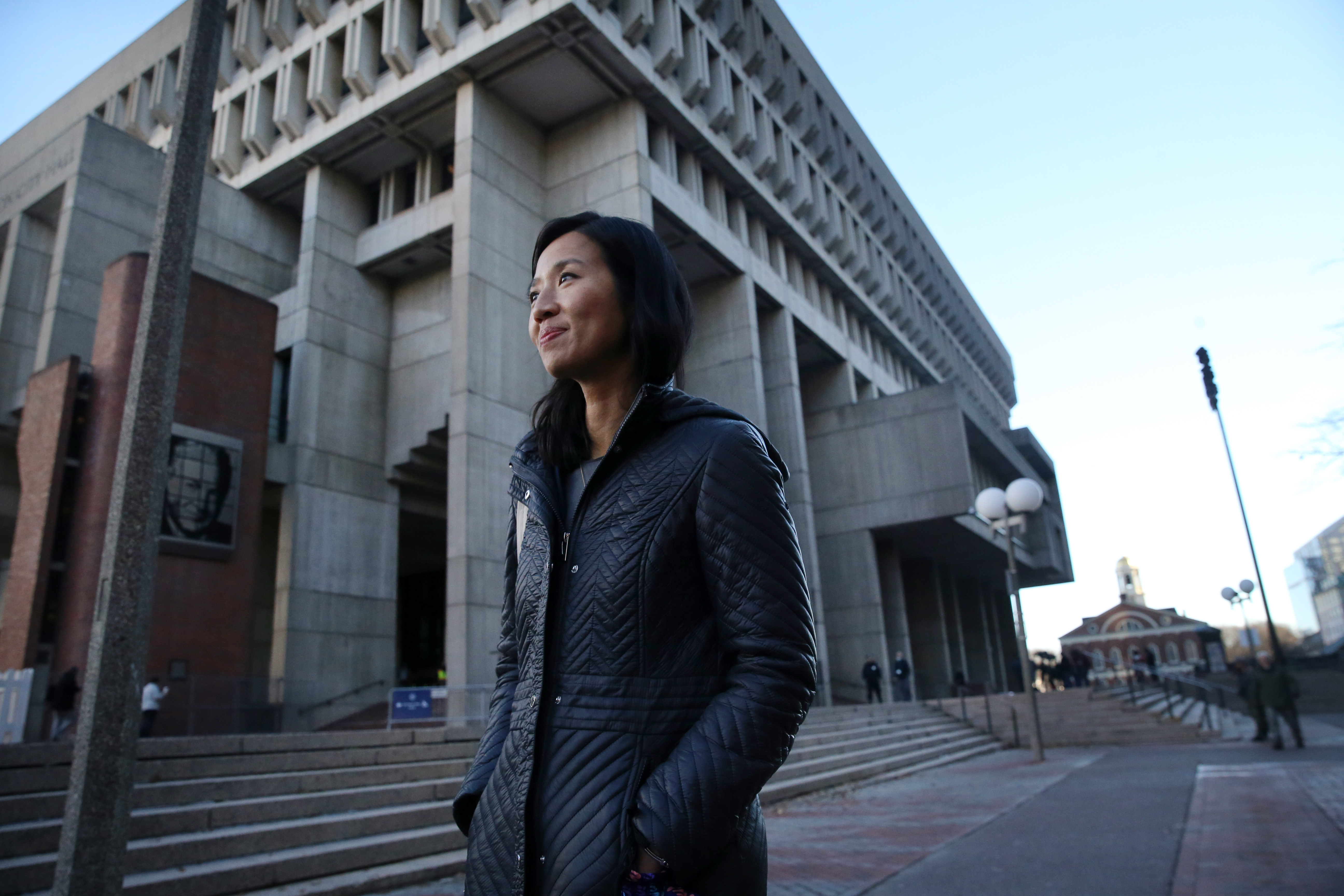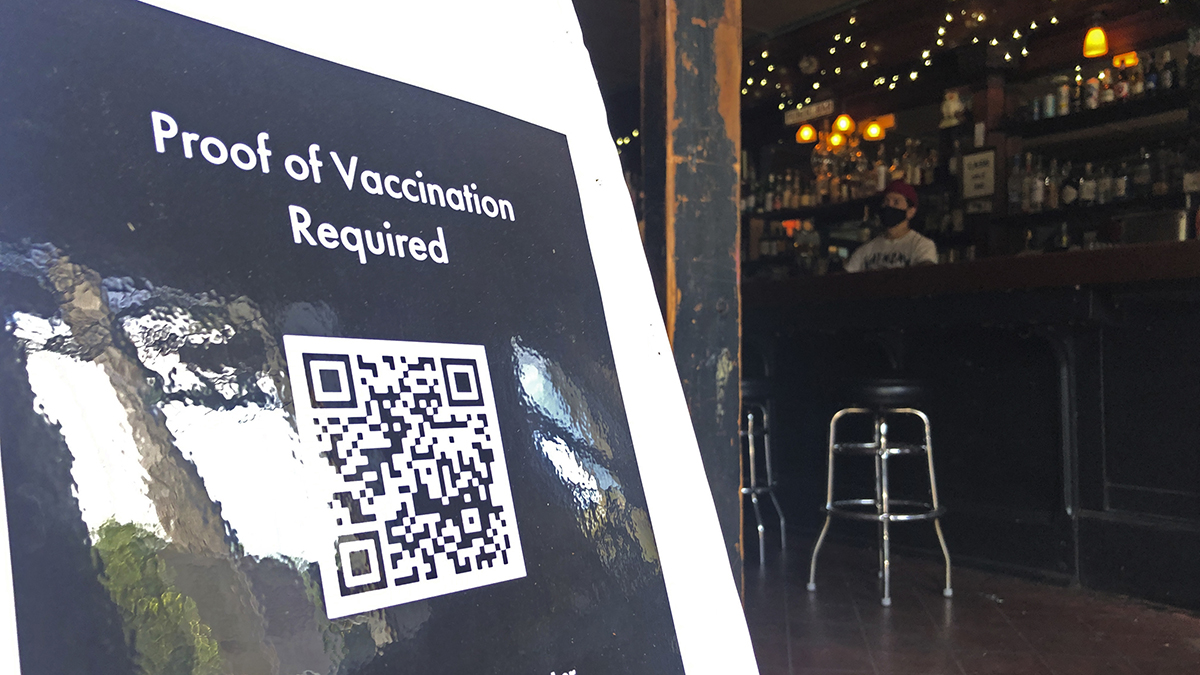Workers and customers at restaurants, gyms and many other indoor businesses in Boston will be required to show proof of coronavirus vaccination starting in mid-January in an effort to curb a rise in new cases across the city and state, Mayor Michelle Wu said Monday.
In addition, city employees will be required to get vaccinated, she said at a City Hall news conference as protesters blowing whistles, shouting "Shame on Wu,'' and singing "The Star-Spangled Banner" could clearly be heard in another part of the building.
WATCH ANYTIME FOR FREE
>Stream NBC10 Boston news for free, 24/7, wherever you are. |
"There is nothing more American than coming together to ensure that we're taking care of each other,'' the mayor said in response to the protesters.
City workers had previously been required to show proof of vaccination or submit to regular testing, but the testing option is being eliminated, she said. Medical and religious exemptions will be considered. About 90% of the city's roughly 18,000 workers are already vaccinated, she said.
Get updates on what's happening in Boston to your inbox. Sign up for our >News Headlines newsletter.
"The vast majority of COVID-related hospitalizations are of unvaccinated individuals, which is impacting our entire health care system and compromising the health of our communities," she said. "Today's steps to protect community members in certain indoor establishments and throughout our city workforce will help ensure that everyone in Boston will be safe."
The indoor mask mandate that takes effect Jan. 15 applies to restaurants, gyms, and indoor recreational facilities including theaters and sports venues, as well as some other businesses, she said. Many businesses already have proof-of-vaccination requirements, Wu pointed out.
The announcement was made in conjunction with several surrounding communities, including Brookline, Cambridge and Somerville.
Boston has seen a surge in COVID-19 cases this month and things are expected to get worse next month with the spread of the omicron variant, said Dr. Bisola Ojikutu, executive director of the Boston Public Health Commission. New positive cases have increased nearly 90% compared to two weeks ago, and the city is now averaging 369 new cases per day, she said. Hospitalizations are up 60% from two weeks ago.
While some small business owners attended the news conference in support of the indoor mask mandate, the state chapter of the National Federation of Independent Business called it an additional burden on already struggling businesses.
"It is unfortunate that, once again, private businesses are being placed in the unenviable position of having to enforce another government health directive,'' Christopher Carlozzi, the organization's state director, said in a statement.
Many businesses that spoke with NBC10 Boston Monday night said they are happy to see the City of Boston take the lead, and it's the right thing to do.
"I think the small business community is waiting for a clear, consistent message on how we keep the residents of Boston safe and I think its about time that we can all be on the same page and move forward with this pandemic," said Mark Harrington with HealthWorks.
Some businesses already have a vaccine mandate in place for their employees while others have taken that next step.
"The Huntington has been checking for proof of vaccination or proof of a negative COVID test since we reopened to live, indoor performances at the end of August," said Temple Gill, with the Harrington Theater Company.
Gill says theatergoers have been mostly grateful for the scrutiny but the city making it mandatory does take the pressure off.
"It means that the burden isn't on arts organizations to put these rules in place and that this will just become standard practice," he said.
"I think it is a really good decision," Tres Gatos owner David Doyle said.
While Doyle applauds the move, though, he does say that policing vaccination will status will be an added stress for an industry already battling exhaustion and understaffing.
"I think that person is going to have on some nights, very difficult interactions with some parties," Doyle said. "One example is a party of six. Four of them have proof of vaccination, two don't. How do you deal with that party?"
Dr. Shira Doron, an epidemiologist at Tufts Medical Center in Boston, says she recognizes the short-term stress.
"It is tough if your business is going to lose money," she said.
Doron hopes something far bigger is at play here, for those who remain on the fence about getting vaccinated.
"If it incentivizes one additional person to get vaccinated, that is one person that may not lose their life or end up in permanent disability," she said.
Restaurants were hit particularly hard by the pandemic, and those that survived had to find a way to reassure their customers. For neighborhood restaurants like the Aquitaine in the South End, that's been a key to getting through.
"People look to us for coming in, comfort. Over the last 19 months, safety, knowing that they can come in and be comfortable so this is just the next level of that," said Chris Glionna, of Aquitaine.
But not everyone is on board, whether it's an incentive or not.
"Me personally, I am not going to ask someone for their vaccination card," said Christan Silvesteri, of Rabia's Dolce Fuma. "If you want to show it to me, show it to me. If you don't, what am I going to do? Kick you out? I'm not going to kick you out, I need you to come support my business."
The Greater Boston Convention and Visitors Bureau released a statement, saying this announcement was not a surprise and they hope the policy supports, rather than inhibits, recovery from the pandemic.



